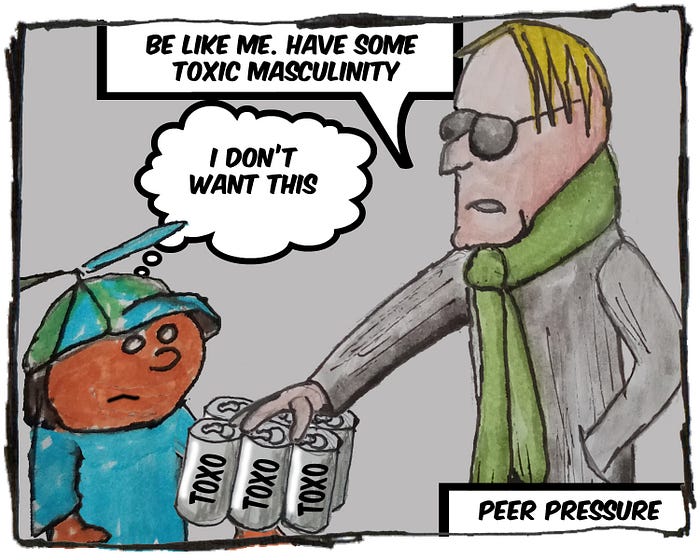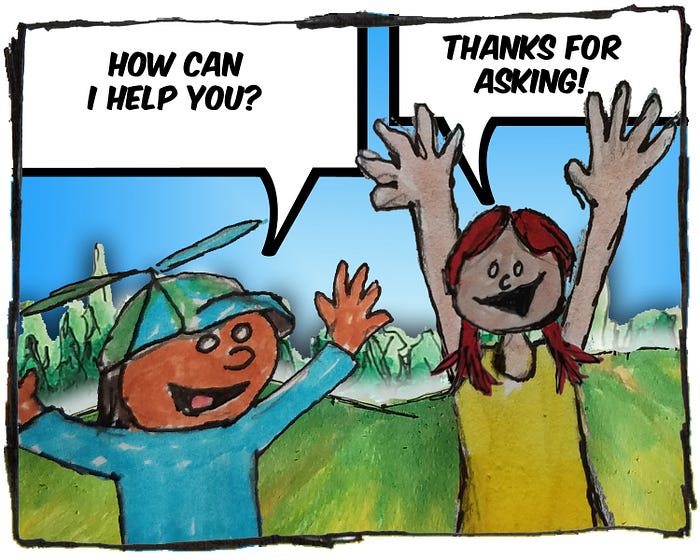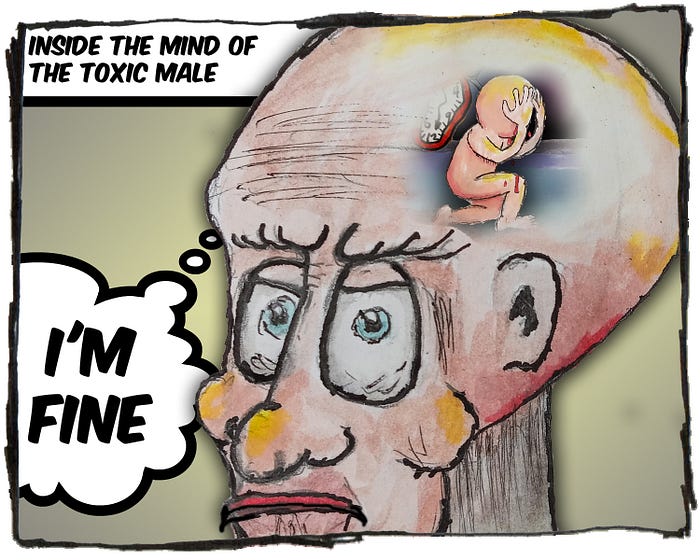Everybody knows that drinking is bad for you. We do it because it feels good. We do a lot of things that are bad for us because they feel good. I believe indulging in a mindset of toxic masculinity belongs in that category.
I quit drinking a year ago. Although I'm proud to have implemented that change, I'm somewhat abashed that it took me 50 years to develop enough emotional maturity to recognize the benefits of sobriety. I wasn't a "bad" person when I drank, but I feel I am a better person now.
Subtle changes in your basic philosophy are what give you the chance to achieve life satisfaction.
I think the root of the problem is that we're all so starved of a sense of self-worth that we immediately gravitate to any form of temporary high we can find. Perhaps many of the problems of our society would evaporate if we recognized that we all bear the burden of the same anxieties.
Imagine if we embraced a paradigm shift that accepted everyone else doesn't have to lose in order for one person to experience the high of a win. What if we accepted that we can all win together?
Don't make things worse instead of better

If anyone had told me that drinking was toxic when I was 30, I would have laughed in their face. In fact, I probably would have deliberately started drinking more.
I liked the high of drinking. I liked the high of winning. I was overly competitive. If I so much as lost a game of Scrabble, it irritated me right down to my bones. My sense of self-worth came from the accumulation of victories.
I was a mess.
I think that the temporary high of toxic masculinity can be compared to drunkenness. I didn't start drinking until I was 26, but toxic masculinity has always been a part of my life. I saw it in the way my father treated my mother. I saw examples of it in the fundamental misogyny of our culture.
You don't question these things when you're growing up, you just do what you're told.
Looking around today, I see a society of broken people fighting over whatever tattered scraps of self-worth they can get their hands on. People don't even consider it might be possible to feel good about themselves without destroying everyone else.
The embrace and celebration of poor sportsmanship
I used to play backyard football with my friends. It felt good to score a touchdown, hold up the ball, and scream, "In your face!"
Even as you do something like that, you know you're being a jerk. But it's fun! It gives you a surge of adrenaline. "What are you gonna do about it? Huh?" Chest thump, chest thump!
The first time you indulge in taunting, you're doing it in mimicry of behavior you've seen from your peers. It's presented as semi-comical. But even when it's done half-seriously, you feel a jolt of energy. Ridicule creates a surge of euphoria followed by a crash.
You want to score again so that you can mock your opponent, louder the next time, and feel the same high. The path of toxic masculinity has you chasing that first high forever.
Why is there no praise for cooperation?
We give lip service to the concept of sportsmanship, but go on social media and ask what people think about participation trophies. For some reason, the idea of a participation trophy is regarded with hostility.
We live in an era where everyone knows our young people are struggling with their mental health. Yet, Americans get offended at the idea of patting a kid on the back and saying "Good job." Why aren't we free to celebrate people who challenge themselves to try something new even if they don't win?
People think of sports as "healthy competition." It's not. It's healthy cooperation. You're on a team. The team wins or loses together. Our society is so hyper-fixated on competition that they are stunned when you point out that a team has to cooperate to succeed.
Your family is a team.
Your nation is a team.
You have to cooperate.
Competition creates losers. Cooperation allows everyone to win. Flip that switch in your brain and embrace the path that leads to prosperity.
How toxic masculinity is handed down
Even when I was very young, I could sense that something was wrong with our culture. I spent a lot of time escaping into the woods to be alone with my thoughts. I read a lot. I looked for role models in the pages of books.
Reading is a means of having a vicarious experience. But, I never imagined myself as a secondary character. I was the protagonist, and my objective was victory. In one form or another, all the other characters were my opponents.
I read a lot of fantasy novels because I found reality oppressive. Most of the books I had access to were written by men. The problem was that the love interest of those novels was based on the male fantasy of the author. It wasn't based on real life. A lot of the men writing these books probably started as frustrated young boys with a low sense of self-worth like me.
This is why it's critical to read books by writers of all genders, sexual identities, and cultures. If you don't cultivate a diverse worldview, you become vulnerable to the life-destroying hazards of flawed ideologies.
It's ridiculous that men can't relate to women

Growing up, I wanted a healthy relationship but I didn't know how to get one.
It's confusing when you see examples of human sexuality in every advertisement, but they're always presented in the form of conquest rather than understanding. The only positive examples were the husband/wife relationships on sitcoms, you know… like The Cosby Show.
I used to watch The Adventures of Ozzie and Harriet and think that represented a relationship I could aspire to have for myself someday. That idea seems laughable now, but at least I was drawn to the illusion of kindness.
I was curious about human sexuality. I was curious about the concept of love. But the simple fact was that I had little guidance to help me identify examples of healthy relationships to learn from.
With the benefit of a mature perspective, I feel there are few examples of those to begin with. On the other hand, there's no shortage of toxicity. Some people are fortunate enough to grow up in a family where respect and mutual appreciation are modeled. That wasn't the case for me.
Playing a video game for girls
Not too long ago, I got a video game emulator for my kids. It had thousands of video games that had been released throughout the decades. One of them was a "video game for girls." The character was a tall blonde who went shopping for shoes. You had to pick the shoes that were the same color as your dress.
I turned to my girls and asked, "Does this game seem fun to you?"
Their faces wrinkled in disgust. "No Daddy, this game is awful."
The scenario left me perplexed. I realized that the game was the end product of a long line of completely misinformed decisions. Somebody had to come up with the concept. Somebody had to write the program. Somebody had to market the game. At no point during any of these stages did anyone stop to wonder if any of the people involved knew what women actually wanted. Nobody bothered to ask a girl. They thought of everything but that.
What a colossal waste of time, energy, and money. The game was probably made by a boy who was trying to be "nice." When the effort was rejected, I expected the "nice" boy flew into a rage.
"Look at the effort I put into this! How can you be so ungrateful?" Entitlement is the opposite of healthy communication.
It's not enough to win, everyone you love must win too
Today, I've been married for 15 years. My wife and I connected on an instinctive level. Early on, I made a deliberate effort to not overthink our relationship. Instead, I practiced gratitude when things were going well, and was mindful to maintain our positive momentum.
Essentially, I avoided all the behavior that our society conditions us to believe is "normal." American relationship behavior is not "normal." "Normal" is how you act when you haven't been taught a bunch of terrible and self-destructive habits.
Toxic men have to flip the switch in their brain that allows them to celebrate when their wife gets promoted, or their children surpass their achievements. You have to learn that when somebody else wins it doesn't mean that you lose. Instead, we can all win.
In fact, we all win, or nobody does.

